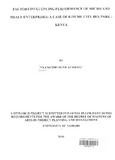| dc.description.abstract | Governments worldwide have acknowledged the impact of Micro and Small Enterprises (MSEs) on job creation, improvement of people's standards of living and hence an overall impact on the economy. The important role played by the informal sector in most economies in less developed countries is now recognized by governments and international agencies. However, enterprises in the informal sector continue to encounter various barriers that prevent them from attaining their full potential. This study sought to establish the factors that influence the performance of MSEs in Kisumu city. It attempted to identify the extent to which the socio- cultural background of the entrepreneur influences the performance of an MSE and how performance of MSEs is associated with the characteristics of the business. It also examined the Government Policy and Legislative processes that influence the performance of the MSE sector.
A descriptive Survey employing the use of questionnaires, an interview and observation schedules were used to collect data from a sample size of 286 Micro and small enterprises picked from a population of 1300 operating within and around a 400 metre radius of Kisumu City's main bus Park. They were selected using stratified sampling, and purposive sampling techniques. Data was analyzed using descriptive statistics such as frequencies and percentages Chi Square tests were used to test the significance of associations between selected variables.
The fmdings were displayed in percentages, frequencies, figures and tables. This study revealed that certain characteristics of the enterprise and the socio cultural background of the entrepreneur have an impact on MSE performance; thus given a conducive environment and adequate support, The MSE entrepreneurs in Kisumu can realise their full potential and maximise their contribution to the country's economic development. The study also demonstrates that with the installation of basic infrastructure, and the elimination of both rigid regulations and the threat of demolition, the enterprises perform more efficiently. This highlights the need for urban planners to allocate land and provide basic infrastructure for the informal sector. | en_US |

